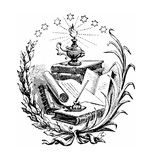
A Woman Philosopher for Our Times
ALICE VON HILDEBRAND, R.I.P.
Ed. Note: Alice von Hildebrand (1923-2022) was a Contributing Editor of the NOR.
How many women philosophers are you familiar with? As a reader of the NOR, the most famous is probably not your favorite: Simone de Beauvoir, a former Catholic and a disciple of Jean Paul Sartre. There is another, an antipode of de Beauvoir, about whom I’d like to tell you.
As a young woman, Alice von Hildebrand fled with her family to New York City to escape the perils of the Nazi invasion of her native Belgium. She studied philosophy at Fordham University under one of the great enemies of Hitler, Dietrich von Hildebrand. (See Alice’s book Soul of a Lion: The Life of Dietrich von Hildebrand for the story of his battle with the forces of fascism.)
Dietrich had been a disciple of German phenomenologist Edmund Husserl, but he became part of the split among phenomenologists due to Husserl’s eventual shift toward idealistic metaphysics. In this he was in league with the most famous of Catholic women philosophers, St. Edith Stein, a convert from Judaism and assistant to Husserl.
Alice, whom friends called Lily, in her autobiographical book Memoirs of a Happy Failure (2014), describes how Dietrich’s classes provided her with tremendous insights into the philosophical truths that underlie the Catholic faith. All along their relationship deepened. Alice went from being Dietrich’s student to his secretary to his second wife, two years after the death of his first wife, Margarete.
In our times, a doctorate in philosophy from a major Catholic university is a steppingstone to a teaching job at a good Catholic college. But back when Alice received her Ph.D. from Fordham in 1947, Catholic colleges in the United States did not employ women as philosophy professors, and Alice was repeatedly denied a teaching position. Instead, she started teaching philosophy at Hunter College of the City University of New York, where she remained for the next 37 years. (It wasn’t until her 14th year, however, that she was given tenure.)
You May Also Enjoy
John Henry Newman, Robert and Henry Wilberforce, and Henry Manning came to realize that their struggle was nothing less than the eternal question of "whom shall ye serve?"
Jesuit missionaries left reports on the martyrdoms of many Native American converts to Catholicism. Not one has been canonized.
My 20-year smorgasbord of denominational affiliations, which I had always regarded as a rich blessing in plurality, became a millstone around my neck.

